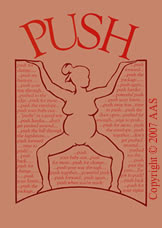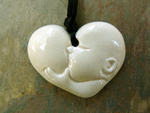-- Carmichael (1954)
What makes you think that the brain starts recording memories at birth or before?"
The question was posed after the blogger posted comments by a neonatal doctor on his blog who blasted my post/statements about babies being aware and conscious and that no matter what happens in birth the caregiver can treat the baby with respect and regard -- because the baby remembers the experience of labor and birth.
.. isn't this common sense? I think what Diane was trying to get at is absolutely correct. Babies don't have "memories" per se, but clearly EXPERIENCES do impact the developing infant. For example, one of the strongest needs of infants is physical bonding. A baby doesn't remember being cuddled by his mother, but clearly that bonding matters in his development. Babies will actually die from lack of physical connection. What makes you think that experiences DON'T have an effect as early as birth? At what age do experiences start to matter for an infant?
Good question. When DOES the human experience start to matter -- pun intended!? When IS IT that a woman should BEGIN to act as if her behavior -- good, bad, or indifferent -- impacts her baby? When does the love, the joy, the nurturing, the conscientious diet, and elimination of stress and toxins matter? What about the science that shows us that the baby in the womb is learning language and taste, shows emotions, and responds to the mother and other outside stimulus? Based on "defensive" caregivers denial should a mother no longer hug her pregnant belly and talk to her unborn baby? Why bother if the baby doesn't RECEIVE it and KNOW it?
Lord o' mercy and Oh, Mama -- the science is pretty clear -- even if those you'd expect to know and behave accordingly don't know it or believe it --- the human being from conception forward is EXPERIENCING, INTERACTING, RESPONDING, and LEARNING. Psst.. it's about cells!
The discussion on the OB's blog occurred in support of her neonatal buddy who took a spin on the tired old media driven spin-machine, using the media slander of Scientology's "Silent Birth" to debunk me and his own colleagues with pictures and narrative about Tom Cruise. Yaaaawn. You forgot to mention Brittney. The docs got so ruffled by the possibility of babies REMEMBERING the treatment by doctors and nurses during birth that they immediately jumped where docs always do -- blame and litigation avoidance (and turf and income protection). And, if you and I believe the scientists they lump into the tired PSEUDO SCIENCE defense, damn it, isn't the worst thing that would happen is the OB's, neonatalogists, nurse, and pediatricians will have to learn and change, too. And, we'll all treat pregnant women, birthing women and babies, and newborns in a more respectful, loving way?
As a physician and writer in this area, I am also excited by the new neuroscience that confirms all that What Babies Want teaches: the existence of preverbal (implicit) memory; the importance of pleasure for optimal brain development; and the negative impact of stress and stress hormones on brain cell growth. We can now say, scientifically, that the happiness that we put into our babies will nurture a healthy brain life-long.
--Sarah Buckley, MD
Your obstetrician, nurse, neonatalogist, and pediatrician mostly will not tell you about how amazing your gestating, laboring, birthing, and connecting baby is -- and many will even deny the science that is showing us that it is imperative that we treat babies differently. Very differently than they are treated in the medical machine. YOU will have to be the one to expect and ask them to treat your baby with respect and awareness.
Read for yourself below about the scientific communities who are studying the prenatal environment as the foundation for health and wellness. You are smart enough and you are a logical, thinking, feeling, and compassionate person who can put one (prenatal brain research) and one (infant brain research) together to make TWO (labor and birth brain matters too). You don't have a couple of hundred thousand or more reasons to deny it. You know that our baby's brains are also working during labor and birth, so that we know babies are affected for life by their birthing experience.
Prenatal/Fetal Programming (Learning, Imprinting)
Peter Nathanielzs, MD (OB), PhD (vet)
Ten Principles of Fetal Programming
From Life in the Womb: The Origin of Health and Disease by Nathanielsz
1.) During development, there are critical periods of vulnerability to "suboptimal" conditions. Vulnerable periods occur at different times for different tissues. Cells dividing rapidly are at greatest risk.
2.) Programming has permanent effects that alter responses in later life and can modify susceptibility to disease.
3.) Fetal development is activity dependent. Normal development is dependent on continuing normal activity. Each phase of development provides required conditions to subsequent development.
4.) Programming involves structural changes to important organs.
5.) The placenta plays a key role in programming.
6.) The developing baby will attempt to compensate for deficiencies in the womb. But that compensation carries a price in later life.
7.) Attempts made after birth to reverse the consequences of programming might have their own unwanted consequences.
8.) Fetal cellular mechanisms often differ from adult processes.
9.) The effects of programming might pass across generations by mechanisms that do not involve changes in the genes.
10.) Programming often has different effects in males and females.
Nathanielsz' work lays out the foundations of fetal programming -- the process by which the prental enviornment interacts with genetic and other factors to produce an individual human constitution. This is parallel to the cellular biology work of Bruce Lipton whose work supports the changing paradigm of the Newtonian science upon which medicine is built. We are not pre-destined and pre-determined merely by our DNA. From before the union of our sperm and our egg we are cellularly INTERACTING with the world. Forever more.
Why do seemingly very intelligent doctors and nurses, for example a neonatalogist from www.talesfromthe womb.blogspot.bom, deny the obvious -- the human being's brain does not shut off during labor and birth so that they can do whatever they want without consequence. And, really ... a blogger with that title who doesn't believe in infant memory (LEARNING!) when clearly, for decades we've known that prenates and newborns learn? It's downright scary what some will call psuedo science just to keep from learning themselves.
http://www.news.cornell.edu/releases/Jan99/womb.hrs.html
Peter Hepper, PhD, Fetal Memories Researcher, Belfast, has been studying the embryonic study of fetal psychology for over two decades. If you google his name you'll find many scientific articles. Ultrasound technology has allowed significant advancements in observing fetal behavior.
Published in 2005 -- http://www.bps.org.uk/publications/thepsychologist/search-the-psychologist-online.cfm?fuseaction=inc_getFile&ID=906&Publication_ID=1
Perinatal Olfactory Learning in the Domestic Dog
http://chemse.oxfordjournals.org/cgi/reprint/bjj020v1.pdf
Janet DiPietro, PhD, John Hopkins, Obstetrics Department
Research and Professional Experience
As a developmental psychologist, my research centers on methods of assessment of risk in infants and young children and their efficacy as predictors of outcome. Specifically, my interest lies in the underlying physiological basis for individual differences in cognition, socioemotional behavior, and temperament. I have explored these relations in early infancy and in the neonatal period, in samples of full-term and preterm infants. My current research program, which has been ongoing for the last 15 years, extends this interest to the human fetus. I have developed computerized assessment methods of measuring fetal neurobehavioral functioning in order to investigate the ontogeny of development with the ultimate goal of predicting clinical and developmental outcome from the fetal period. Within this context, I am further exploring the role of maternal factors, including poverty and psychologic stress, in mediating fetal development. Application of principles of developmental psychology and psychophysiology to the antenatal period represents a new frontier that manifests unlimited potential for uncovering new knowledge about the origins of human behavior and development.
http://www.blackwell-synergy.com/doi/abs/10.1111/j.1469-
From Kids Health.org -- about as mainstream as you can get.
During this time, you will see your baby's personality emerge. In the first month or two of life, the baby depends on you to initiate any interaction. But by the end of the third month you will find your baby engaging you with his or her expressions, vocalizations, and gestures. Your infant's eyesight will be improving, and your child is better able to distinguish between different sights and sounds. Your baby will be carefully watching your facial expressions and listening to your voice, responding to you with coos and gurgles, and around 2 months, respond to your smile with a smile. Between 3 and 4 months, most infants can squeal with delight and laugh out loud.
Research shows that a baby’s brain is designed to be extremely receptive to experience. With each experience, babies gain a broader understanding of their world. They use the same parts of their brains as adults do, though their brains are less mature. By one year of age, so much development has already occurred that a baby’s brain will more closely resemble an adult brain than the brain of a newborn.
University of Missouri
Infant Cognition Lab
http://web.missouri.edu/~luoy/
Tulane University
The Infant Institute
http://www.infantinstitute.com/
Stanford
Center for Infant Studies
http://www-psych.stanford.edu/~babylab/
University of Wisconsin
Infant Learning Laboratory
http://www.waisman.wisc.edu/infantlearning/current.htm
Northwestern University, Chicago
Early Learning Laboratory
http://www.communication.northwestern.edu/csd/research/early_learning/
University of Maryland
Maryland Infant Studies Laboratory
http://www.bsos.umd.edu/psyc/woodward/lab/directions.html
New York University
Infant Cognition Center
http://www.psych.nyu.edu/infant/
University of Texas -Dallas
http://www.utdallas.edu/~mspence/project.html
Babies learn rapidly about the sights and sounds of their environment, and how to affect the people and objects that make up their worlds. Consider the following accomplishments in the infant's life:
- Within just 2 days after birth infants recognize their mother's voice, and prefer it over other voices. **
- Three-month-olds can detect primary colors, and prefer red and yellow over blue and green.
- Seven-month-olds can match an angry or happy face to a voice expressing the same emotion.
- Nine-month-olds can watch simple actions and remember and imitate them one week later.
** Ninety-nine of the babies in these research projects were born in hospitals with up to 80% or more born under the influence of drugs while their mother's were supine closing in her pelvis up to 30%, making birth much more traumatic. Research has not been conducted to determine infant or human potential on non-drugged, non-traumatized humans -- in infant memory, or any field. Once one has witnessed the uninterupted, stress-free, intervention-free, and drug-free birth and has personally seen that these baby's respond to their mother's voice within minutes, one can not help but explore the wonder of the prenate, laboring and birthing baby, and newborn as fully sentient.
Tulane University, New Orleans, LA
The Infant Institute -- www.infantinstitute.com/
Infant Communication
Early Learning Laboratory
http://www.communication.northwestern.edu/csd/research/early_learning/
Infant Mental Health
Infant mental health may be defined as the state of emotional and social competence in young children who are developing appropriately within the interrelated contexts of biology, relationships and culture.
--Zeanah, Charles in Zero to Three, August/September, 2001
The Infant-Parent Institute, Champaign, IL, Michael Trout, Director. -- http://www.infant-parent.com/
Illinois Association for Infant Mental Health - www.ilaimh.org/
Austrailan Association for Infant Mental Health - www.aaimhi.org/
Michigan Association of Infant Mental Health - www.mi-aimh.msu.edu/intro/index.html
Just google to find your state.
CURE AUTISM NOW - This study examines the motor and cognitive development of young infants to better understand the early signs of autism and other developmental disorders. Investigators at the Kennedy Krieger Institute’s Child Development Lab will observe infants between 3 and 7 months of age who could be in one of these 3 groups: http://www.cureautismnow.org/site/apps/nl/content2.asp?c=bhLOK2PILuF&b=1288037&ct=2757403
DOMESTIC VIOLENCE -- Michigan State University. The Mother-Infant Study http://www.msu.edu/~mis/. Resources: http://www.msu.edu/~mis/present/present.html
So, read for yourself and join me at looking at posts like at http://www.talesfromthewomb.blogspot.com/, April 22, 2007, Debunking the Pseudo Science of Infant Memory. You might want to consider becoming a very wise consumer in the obstetric medical field. They say induction, epidural with fentanyl and narcotics is safe for the baby and they say cutting through a woman's abodominal wall to pull her baby out is safe for her and doesn't harm the baby. You decide if it's scientific and logical that the science that tells amazing, indepth info about the learning environment of the womb and the first days and weeks of infant life doesn't also tell us that babies feel, respond to, learn from -- and, therefore, remember, unconciously -- what they experience in their labor and birth.








3 comments:
Baby Keeper, perspective really changes how things are read. I don't think the author "blasted" you at all in this post.
Could he have completely smeared you personally instead of just writing about the science and the philosophy/psychology regarding those who adhere to this still unproven in a peer reviewed manner theory/pseudoscience? Yep. He didn't.
Does he disagree with you? Yes.
Did he resort to name calling as you did on your blog? No.
Did he state that you refuse to learn new things? No.
Did you? Yes.
All those links you put in mean nothing when it comes to a premature infant who still has millions of neuronal connections that will not occur as a result of normal biology--not from any treatment.
No where did he say that a mother or medical team can do whatever to a fetus, premature infant, or full term infant. Yet, you decided to make a fallacious jump of logic to that point.
If what you and others believe is true (especially Frederick Wirth), then all the blame for my child's prematurity likes solely on me. However, I have no idea what I did incorrectly. I was thrilled to be pregnant. I ate properly. I took plenty of time off from work to just exist with the two lives growing within me. I have one normal child and one not so normal child. Your theories and those of others are only trying to find some reason for why things go wrong. The truth is that sometimes it is genetics or stress from an unforeseen event or just reality.
We cannot control how everything goes in our lives. Quit slinging your lies and bogus theories. As my chosen name says, I know this doctor. He fought to have the proper care, including kangaroo care, for my children. He was a tireless advocate for them.
Mom of NICU graduates:
Your graditude for your NICU physician and your defense of him is understandable and admirable.
I am sure he was extraordinary in his care and advocacy. This is not about him (there was zero name calling), however, and it's not about your and your babies unless you make it so. And, then it has nothing to do with me. The science stands on it's own regardless of what you believe. (Did the info about epidural and cesarean comment at the end trip this trigger? You know, the greatest disservice to women and babies is the denial of the impact of these on them -- EVEN when needed to save their lives. If the truth of it were acknowledged a woman and her baby could get help for it rather than having to carry it around for their entire lives. There is also science and technology to support healing it.
Here's the progression -- I posted a reasonable comment in response to his blog post, and he devoted an entire post about what I said. Yes, it was derrogatory -- to MY profession and more so to a mutual colleage whom I happen to respect greatly. There was no reason to "blast" and discredit Dr. Wirth whose work is very scientifically based. Another blogger physician picked up the thread and posted your physician's on hers, with care not to mention me -- which I won't get in to here. In my post on my blog, I refered to both of them and what they wrote.
I get to express myself on my blog -- just as your physician does on his. You are right -- we don't get to control everything. He quite blatantly expresses himself towards our president -- something that some would feel as offended over as you seem to. I have an emotional, maternal connection as you do. My son is in Iraq sacrificing his life to maintain our freedoms that both physicians and I and you expressed here. You're welcome - someone's children had to be the ones. My son will never be the same. Yep, things beyond our control happen. I know. You learned it early, unfortunately. I could post to your physician calling him a liar and to quit slamming my president because MY son is there. It is happening to me!. It doesn't change the fact that your child experienced life threatening entrance into the world. It doesn't change the fact that my child is in life-threatening danger as well. Do you think that it is possible for any of our men and women to go to Iraq and not be affected by war? While the VA argues about who has PTSD -- do you think it is possible to go to war and NOT be affected? Do you know what it takes for them to prepare to go and to be in life threatening danger 24/7? They are 6,000 miles from the land of the free and the comfort and safety of home. Not one will be "ok".
Our highly charged experiences with our children doesn't change the science. Your child lived through a life threatening situation and gifted and skilled caregivers (is that the name calling you refer to?) took care of them. They experienced it. We owe to our birthing babies to acknowledge them and to improve the conditions -- this is why women want to birth at home.
The "bogus theory" is scientifically founded. To suggest -- yes, emphatically -- that doctors, nurses, parent, and society see the proliferation of research about 1) the prenate's experience and learning and 2) the newborn/infant experience and learning ALSO tells us that the laboring and birth baby also is reacting to the experience and that neurons are wiring up in response to that experience just as it was doing months, weeks, and days before birth, and in the weeks after.
This counters the notion that we can do whatever we wish to the mother and baby during labor and birth -- as long as it is in the hospital and we have a license and malpractice insurance. The premise that baby's aren't affected by drugs, interventions, their mother's fears and joys, noise, lights, strangers, shots, the neonatalogist rubbing his chest so hard that they skin comes off is false. The premise that AFTER they leave the hospital at some arbitrary time in infancy, they suddenly are affected by what parent's do is false.
There are zero lies. My presentation of the existing science that shows we should recognize that the laboring and birthing baby experiences, responds, and learns in response to his environment JUST as the prenate and the newborn does is based on science.
It doesn't discount your experience or anyone's -- unless you let it. Truly, the acknowledgement of the critical period of labor, birth, and days following, while undergoing medical care, can only help to enhance the baby and parent's experience. To recognize that the baby -- in his body and his brain -- will hold the memory of the experience.
It's too bad the message of my post here is lost in the perceptions you have as well.
THE POINT of it all is that yes, the baby does experience labor and birth NICU -- life saving and traumatic at the same time. Yes, the baby feels and remembers it. Just because NICU doctors and parents of NICU babies might find that discomforting, doesn't make the science go away. There is an amazing cutting-edge collective of a diverse group of professionals, including OB's, RN's, Neonatalogists, and pediatricians who are implementing the information. They have amazing information about the long term effects of the care during prenatal, LABOR AND BIRTH, and, postnatally. They have techniques for assisting mothers and babies to reconnect and heal what they didn't get to have. At least you know this now for later. My work with NICU babys afterwards has given me some good information to help understand the relationship dynamics of later life. It's out there should you ever decide it makes sense, like when your child "over reacts" to lights, beeps, and touch. The help is there -- that's all I want you to know. The baby has his or her story to tell about her experience -- when it's heard it creates and allows integration of the love the parent has and the deep compassion the staff had DURING the necessary and violating medical care.
So, I have not discounted the role of the neonatal physician and nurses. I "made fun" of the use of scientology and media BS about silent birth and Tom Cruise to discredit the obvious science that is about labor and birth as well as prental and post natal development. It's so simple and obvious to me that I am always surprised to see professionals so against it.
Neonatal physicians are advocates for the babies in their care. Often they are the ones to lead the field of obstetrics in treating babies with more respect. They will and do when they are open to the information.
I might point out that it is a usual tactic for some one defending their belief system to post so many links to stories that no one will follow all of them to determine if the links presented are actually relevant to the post. That doesn't help your argument. Neither does making a post so long that very few people have the time to read it at all. You might reach more people if you were to tackle one subset of what you wrote at one time--say like over a week or a month.
You did actually say that the doctor in question wasn't going to learn. That is, in essence, name calling. If he were the doc to my children and had done a good job with them, then I would be offended as well.
The information you presented was broad, interesting, and made me think (although not follow all those links). I disagree with Dr. Wirth and the methods of his studies, but that doesn't mean that I disagree that babies feel something. I also don't think that the doc from Tales from the Womb would deny that either. You just don't like his politics, and that appears to have affected your reading of his posts. Demonizing everyone who follows evidence based medicine isn't a good tactic either.
And, lastly, you completely alienated me when you made this statement: they say cutting through a woman's abodominal wall to pull her baby out is safe for her and doesn't harm the baby. Good grief, lady. In some cases, this is the only way that a mother and child will not die--including me. Statements like those make reasonable women want to never read another word you write. C-sections may be over used, but they are definitely safer than dying.
Post a Comment